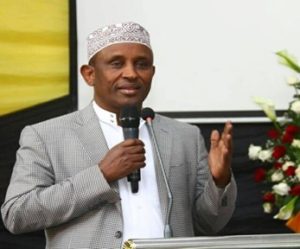Editor’s Note: WardheerNews would like to share an interview previously published and conducted with Mr. Ali Bunow Korane for his first attempt of the governorship on June 1, 2011. Adan Makina conducted the interview for WardheerNews.
___________
WardheerNews (WDN): Mr. Korane, can you briefly tell us about your background?
Ali Bunow Korane (ABK): I am a son of Garissa County with 25 years government experience at administrative, policy, and security management levels. I have various certificates, Diplomas, three academic degrees; one Bachelor and two Masters and currently pursuing a Masters in Business Administration (MBA).

WDN: Could you please give us specific information on the circumstances that led you to run for the position of governor for Garissa County?
ABK: The concept of a devolved government is a new one mooted under the recently promulgated constitution. The setting up of a government at the county level will face a number of challenges. While the challenges to be faced by the counties are common for all the 47 counties nationwide, the pastoralist counties of which Garissa is one will face tremendous challenges. Among these are:
- The counties are already victims of low intensity wars over resources and these will be exacerbated by the new contest for positions and resources allocation.
- Clan structures and family allegiance have overtime emerged as the strongest basis for political mobilization. The resultant stiff competition for positions and resources will likely further marginalize minority clans and others often classified as peripheral and corner tribes groupings.
- Weak and ineffective institutional capacity, the low levels of education and the migration of the professional class to Nairobi has left the local leadership in the hands of semi-literate mediocre individuals.
- Poor infrastructure, large land mass, environmental degradation and clan settlement patterns will generally pose serious challenges thus compromising the process of political mobilization.
To address these challenges I believe requires a leadership with the requisite experience in government, management and above all a clear understanding of the people and their aspiration. After careful reflection I have concluded I am the right person for the challenging governor’s job.
WDN: In the past, district leadership was based on nomination by the decree of the president, recently that system has changed. What can you tell us about the current system of electing the governor?
ABK: The Governor under the new constitution will be elected by the whole of Garissa County as a single constituency. Once elected he/she will be the executive, administrative, and political head of the county government. He/she will be assisted by a County Executive Committee (cabinet) appointed by him/her and approved by an elected county assembly. The county government will be independent in its operations and will not be subordinate to the National government.
WDN: Kenya is considered one of Africa’s largest economy and East Africa’s economic powerhouse, yet the Somali inhabited region is lagging behind the rest of the country. What do you think are causes of the lack of progress and development in Kenya’s North Eastern province?
ABK: North Eastern Kenya has had a sad history of marginalization in both pre and post independence periods of Kenya’s history. This is due to a combination of factors including oppressive government policies; poor leadership, environmental factors and perennial low intensity inter clan resource conflicts, among others.
WDN: Why is it that the concerns and interests of the Ethnic Somalis were not voiced, particularly when there are many Kenya-Somalis in the high ranks of government?
ABK: Somalis have occupied two levels of senior positions in the Kenya Government. These were at political and civil service levels. At the civil service levels they were policy implementers mainly serving other Kenyans in parts outside North Eastern Kenya. It was the responsibility of elected political leaders to influence government policy towards the Somalis. Unfortunately they failed to deliver on this score.
WDN: If you were to be elected governor, how are you going to enhance the growth of the county notably by eradicating extreme poverty and hunger and educating the mass, combating diseases and violation of human rights, developmental and self-sufficiency programs?
ABK: The social situation in the county is very grave on any measure of human development. The extreme poverty level, currently estimated at 71% of the population negatively affects every aspect of life. There have also been large scale human rights abuses by the security forces over the years. I am determined to make my contribution in reversing the suffering of our people.
Read more: AN INTERVIEW WITH ALI BUNOW KORANE
WardheerNews
We welcome the submission of all articles for possible publication on WardheerNews.com. WardheerNews will only consider articles sent exclusively. Please email your article today . Opinions expressed in this article are those of the author and do not necessarily reflect the views of WardheerNews.
WardheerNew’s tolerance platform is engaging with diversity of opinion, political ideology and self-expression. Tolerance is a necessary ingredient for creativity and civility.Tolerance fuels tenacity and audacity.
WardheerNews waxay tixgelin gaara siinaysaa maqaaladaha sida gaarka ah loogu soo diro ee aan lagu daabicin goobo kale. Maqaalkani wuxuu ka turjumayaa aragtida Qoraaga loomana fasiran karo tan WardheerNews.
Copyright © 2024 WardheerNews, All rights reserved


